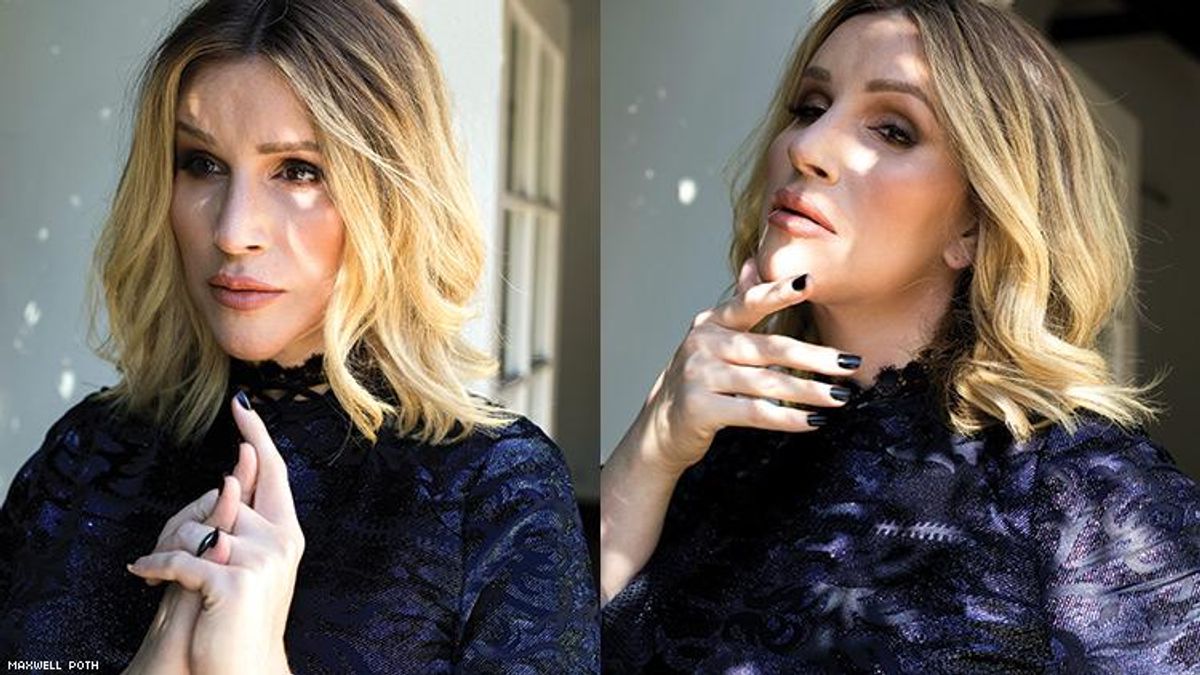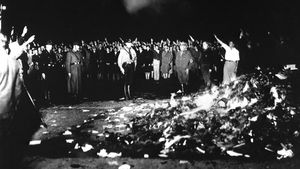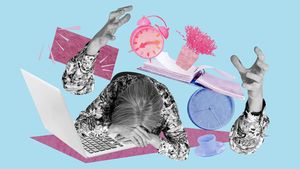Our Lady J rarely thinks about being the “first” of anything. The classical musician and writer/producer of FX’s Pose insists the integrity of one’s art should come before all else. For a slightly reserved writer, who still calls herself a “hillbilly in Hollywood,” being called a trans pioneer is hard to accept. Yet Lady J can’t escape the truth: she’s a trailblazer.
Lady J has been tipping the scale in trans visibility for the last decade. Not only was she the first out trans woman to perform at Carnegie Hall, she was also the first to be hired as a writer on a major TV show and first to be nominated for a Writers Guild Award, both for Amazon’s Transparent. This year, Lady J disclosed she’s HIV-positive, adding new firsts in the process.
While she had previously mentioned her status on social media, it wasn’t until she told the Pose writing staff—in the midst of writing the show’s first season — that she realized the power of coming out. The experience was nerve-wracking, but it was met with incredible support.
“It’s not something a lot of people talk about at work unless they’re close with their coworkers,” she says of disclosing. “But as a writer, the writers’ room is a really safe space, and it is a space where to make these characters real and to give them life, we all share experiences of our own lives.”
Today, Lady J is arguably the most powerful out poz TV writer in Hollywood. Writing for the Ryan Murphy-led Pose is a perfect fit. Set in the 1980s, during the height of the AIDS crisis, the show is carving a new place in the television landscape, breaking the record for the highest number of transgender actors in series regular roles. Having Lady J’s voice at the table during the writing process sharpens the nuanced portrayal of the issues trans women face living with HIV.
Hollywood is a long way from where Lady J started: born and raised at the northern tip of the Appalachian Mountains in southern Pennsylvania, a place that still inspires her. “You can move across the world, but you’ll still have the values instilled by the community that raised you,” she says.
Discovering her trans identity wasn’t easy back home. She described the journey as “detangling the lies people had told,” adding that “it didn’t feel like a decision. It felt like I was shedding what didn’t belong to me. The person I am now is the person I was born to be.”
She eventually moved to New York City in 2000, and found work as a rehearsal pianist. Before she knew it, she received a helping hand from an unexpected source.
“Dolly Parton found out about my music and asked to meet me,” she says. The young singer had been covering a few of Parton’s hits, and when the country legend and fellow Appalachian native found out, she reached out to Lady J. After a friendship developed, Parton helped fund her top surgery.
“Dolly Parton helped me get my boobs,” she quips. Because of Parton’s popularity back home, it validated Lady J even more. “That earned me a lot of respect where I come from.”
But not everyone was as accepting. “I couldn’t come out at work, so I was presenting male during the day, presenting female at night, until it all finally came into one,” she remembers. “Around that time, I did find community. It was wonderful to have the resources that New York has.” Organizations like Callen-Lorde and GMHC “changed my life” and “gave me a sense of stability in a time that felt so unstable.”
Her first love, classical music, also saved her life by providing jobs that paid her bills. Lady J describes playing the music of Tchaikovsky, Beethoven, and Bach as “transcending time” and a “magical experience.”
But the magic would come to an end on September 11, 2001, when N.Y.C. changed overnight. She somberly reflects, “I think it’s taken me 17 years to really grieve that day.” Eventually, her grief prompted a move to Los Angeles.
Years later, when Jill Soloway hired her as a writer on Transparent, Lady J channeled the emotional lessons learned in those earlier days to write some of her best work — and many of the show’s most iconic moments. In the process, Lady J says she became closer to the trans community, reflecting, “I think as a singer-songwriter I really learned to be loud, and as a writer, I learned to be quiet.”
A fine example is the intimate and complex relationship between Trace Lysette and Jay Duplass’s characters on Transparent, which beautifully depicts the rarely explored experiences trans women have when dating cisgender straight men. The two characters fall for each other, only to face conflict when Lysette’s character comes out poz. Photography by Maxwell Poth
“That particular storyline came from my life,” the writer says. “I was frustrated with how many men... don’t understand what undetectable is, how many people don’t understand what PrEP is. I’ve been undetectable for 12 years. To still be dating and have men be afraid of contracting HIV from me just spoke to how much misinformation there is out there.”
When someone who’s poz reaches undetectability, their viral load is suppressed to such low levels that it’s virtually impossible to transmit HIV. Educating the general population about this fact, Lady J argues, is the key to eradicating stigma. And she intends to take that message to the writers’ room.
“I wanted to enlighten and I wanted to educate,” she explains of the Transparent storyline. “I certainly feel a responsibility, now that I am in those rooms, to hire other people and to encourage diversity among my colleagues.” She also advocates for “talent over experience” when giving opportunities to emerging young artists.
“We’ve proven you can make trans content with trans people in front of and behind the camera,” Lady J proclaims. “Now that we’ve done that, there’s no excuse. We’re only moving forward from here. And if we do move backwards, thank God for the activists who will say something.”

















































































